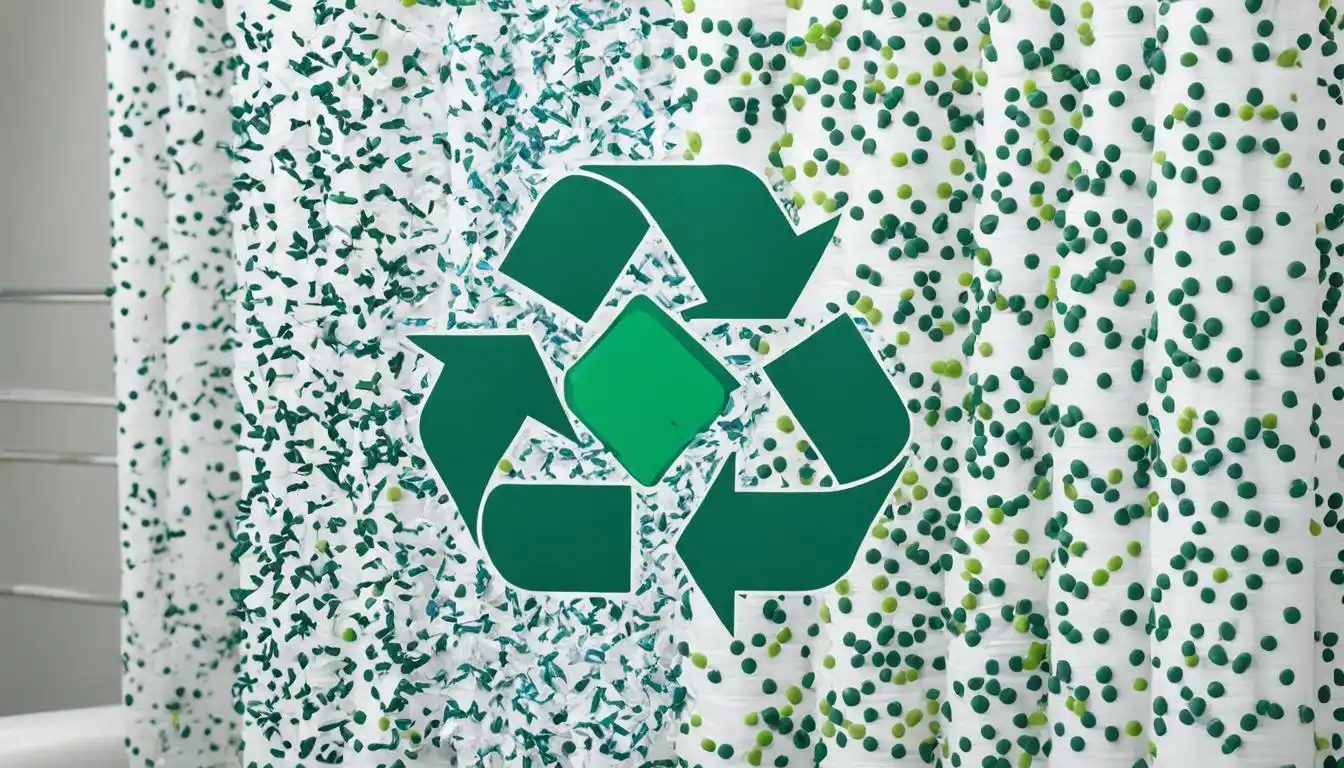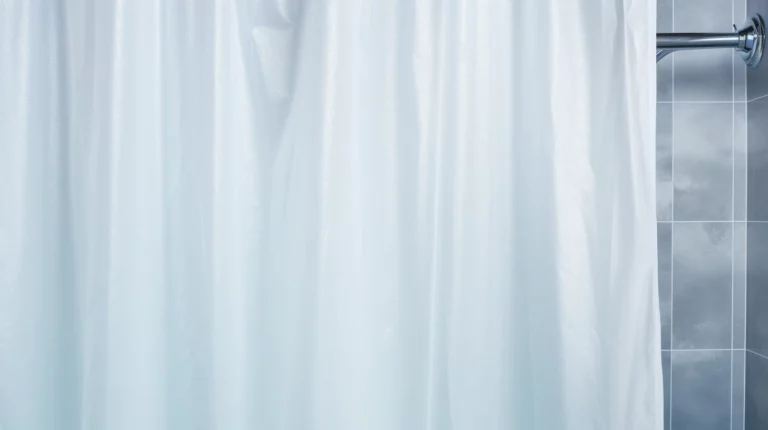5 Surprising Mystery: Are Plastic Shower Curtains Recyclable?
As you seek to dispose of an old shower curtain, you might ask the question: Are plastic shower curtains recyclable? You’re not alone in pondering this matter. Many eco-conscious individuals are looking for guidance on how to recycle plastic shower curtains. The answer is not straightforward, as it often depends on the type of plastic the curtain or liner is made from.
It is important to be environmentally conscious when replenishing home essentials, such as the shower curtain, in order to reduce our carbon footprint.
Table of Contents
Are Plastic Shower Curtains Recyclable: Key Takeaways
- Understand the recyclability of plastic shower curtains and liners before disposal.
- Identify your shower curtain’s material to determine if it’s recyclable.
- Local municipal programs vary; confirm if plastic curtains are accepted curbside.
- Responsible replenishment of bathroom items is part of environmental stewardship.
- Recycling plastic objects reduces landfill waste and conserves resources.
- Always refer to your local recycling guidelines for proper disposal methods.
Are Plastic Shower Curtains Recyclable?
Understanding whether you can recycle plastic shower curtains needs knowledge of the materials and available recycling programs. Every plastic shower curtain has a lifecycle. Determining whether they are recyclable is not always straightforward. Your local municipal waste management authorities are a primary resource. They set the guidelines for curbside recycling. It’s essential to know what types of plastics your community’s recycling program accepts before tossing your shower curtain into the plastic recycle bin.
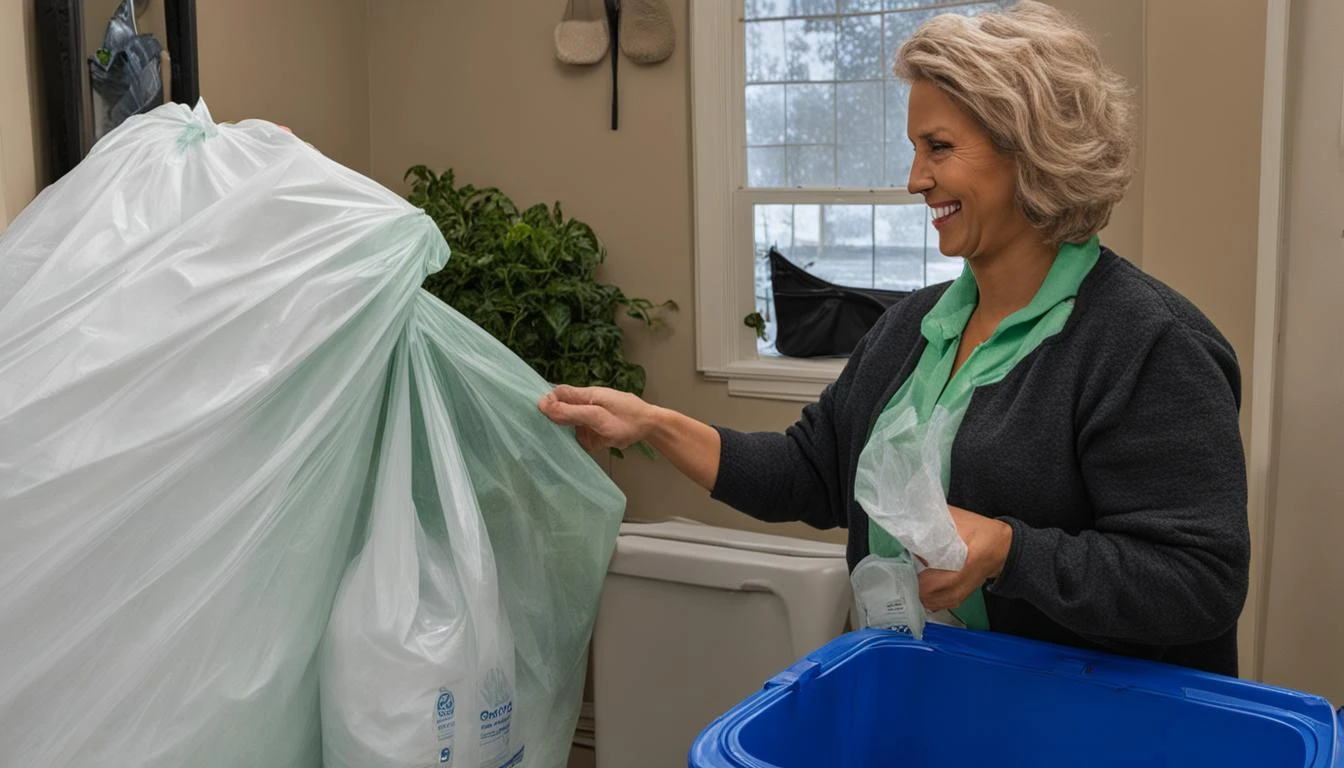
Each plastic shower curtain usually bears a symbol indicating its plastic type. Knowing this symbol assists in establishing whether recycling facilities accept the material. Common plastic types, such as PVC, may not be widely accepted due to their challenges in recycling processes. But newer materials like PEVA could be more likely to have a recycling path. This will depend on your locality’s capabilities and policies.
Before you decide to replace your plastic shower curtain, check local guidelines to see if your item is indeed recyclable.
Given the complexity and variety of materials, contact your local recycling program for specific recycling instructions. They can advise on cleaning items and removing parts like metal grommets or hooks. This step ensures you follow local regulations and supports the recycling process.
Municipal programs and facilities vary in their capacity to process different plastics. In some cases, facilities cannot handle shower curtains for recycling purposes. As a result, consider alternative recycling options or upcycling methods to prevent the curtains from being sent to a landfill. These measures can help to reduce waste and conserve resources.
| Material Type | Curbside Recycling Acceptance | Alternative Disposal Options |
|---|---|---|
| PVC (polyvinyl chloride) | Rarely accepted | Special drop-off locations or upcycling |
| PEVA/EVA (ethylene vinyl acetate) | Sometimes accepted | Upcycling or second-use applications |
| Other recyclable plastics | Check with the local authority | Recycle centers or upcycling when curbside not available |
When in doubt, contact your local waste authority or visit their website. By ensuring your plastic shower curtain ends up in the right place, you contribute effectively to the recycling chain. Consider this responsibility as part of your duty as an environmentally conscious consumer.
Composition of Plastic Shower Curtains
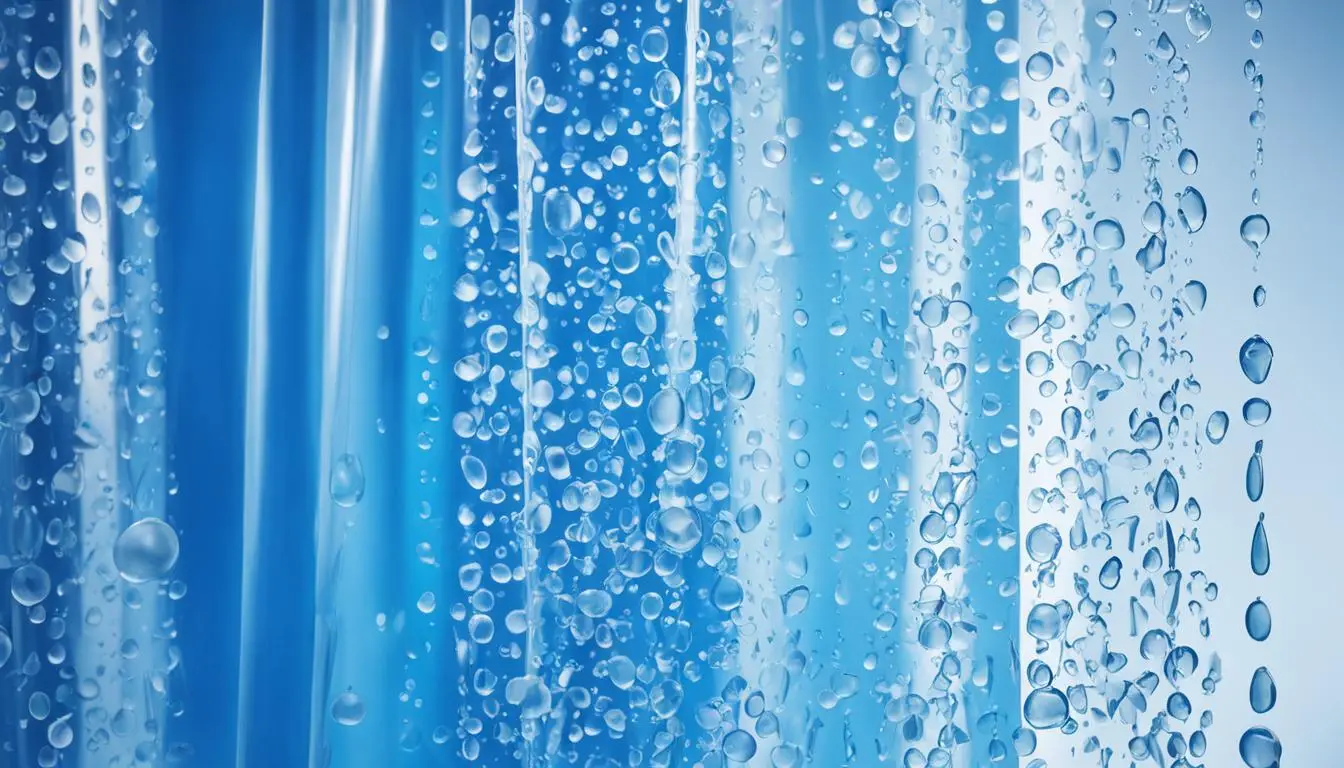
It is crucial to understand the materials of shower curtains for health, environmental, and aesthetic considerations. Common materials like PVC, PEVA, and EVA dominate the market for their waterproof qualities and affordability.
PVC, often called plastic curtains, is notable for its durability and low cost. However, it has been under scrutiny due to health concerns about its potential release of VOCs. Conversely, PEVA and EVA are safer alternatives. They provide similar benefits without the associated risks. Here’s a breakdown to help you determine which plastic shower curtain liner is most suitable for you.
| Material | Features | Recyclability | Health Considerations |
|---|---|---|---|
| PVC | Waterproof, Durable | Low (varies by facility) | Potential VOC emissions |
| PEVA | Waterproof, Chlorine-free | Moderate (check local programs) | Minimal VOCs |
| EVA | Waterproof, Soft to the touch | Moderate (check local programs) | VOC-free alternative |
Challenges in Recycling Plastic Shower Curtains
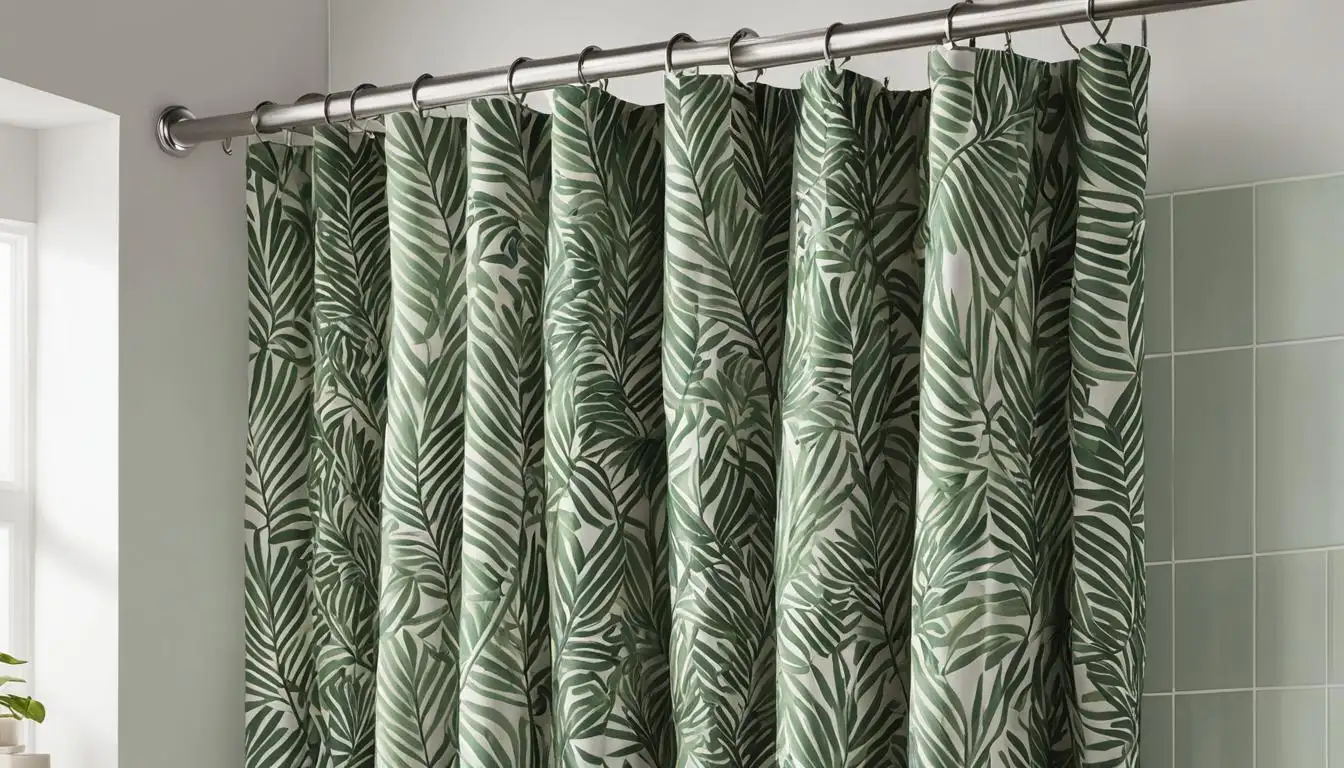
Recycling plastic shower curtains presents a unique set of complications. When you want to recycle them, it’s not as straightforward as you might think. You need to figure out the composition of the curtain liners. You also need to deal with the challenges of mixed materials that are present in many curtains. Even though these curtains are durable and machine washable, these features can mislead consumers into thinking that they aren’t recyclable.
The older shower curtains are usually made of PVC. It’s a type of plastic that is not easily recyclable. This makes it difficult to dispose of them in an eco-friendly way, resulting in increased waste.
A significant barrier is also the potential for contamination. Shower curtains frequently attract mold and mildew. Thus, they need thorough cleaning before they start the recycling process. Let us examine some common issues more closely:
- The presence of mixed materials complicates the recycling process.
- The challenge of recycling non-biodegradable plastics, such as PVC.
- False impression of infinite usability due to their durability.
- Contamination with mold or mildew inhibits recycling.
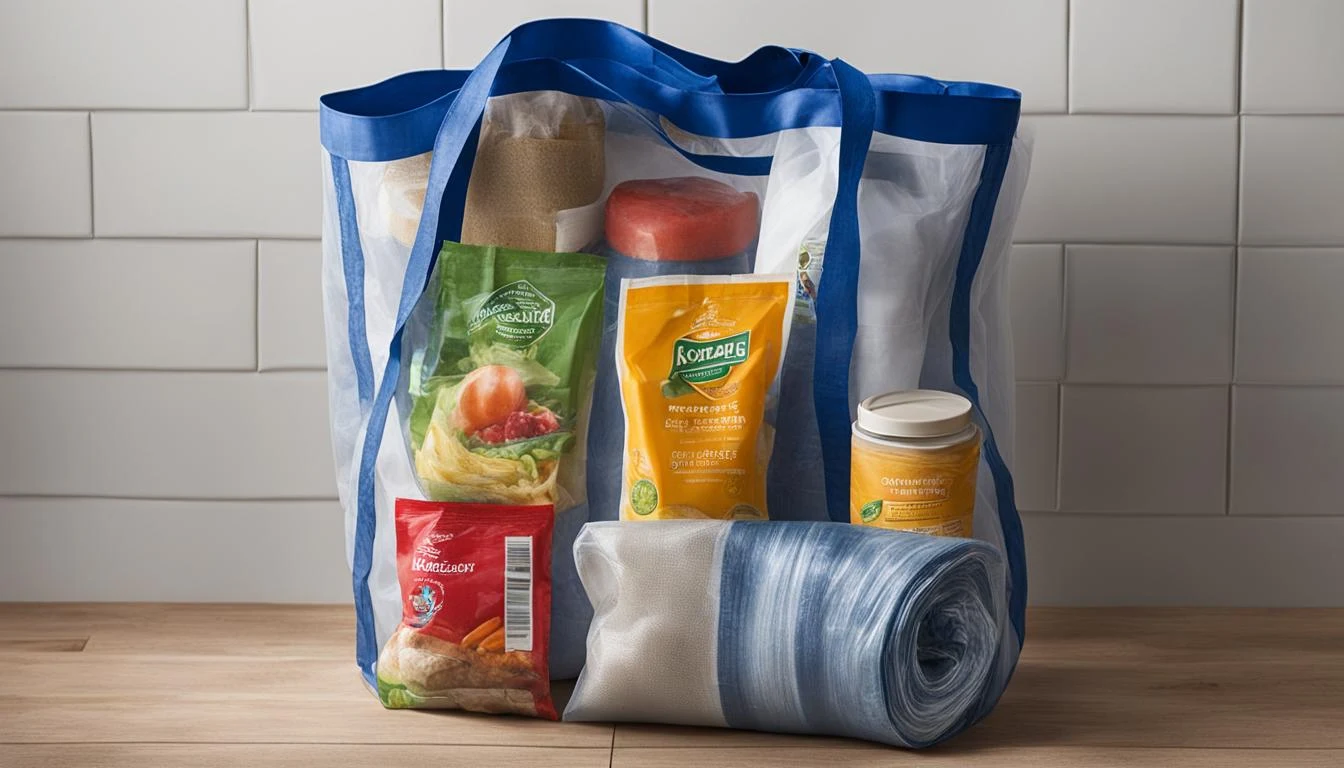
It’s important to understand that while a curtain might be machine washable, that does not equate to it being recyclable. Differentiation is key.
To properly manage plastic shower curtains, we’ll guide you through recycling and suggest eco-friendly alternatives for your bathroom.
How to Recycle Plastic Shower Curtains
Embracing sustainability can often start with a simple act of recycling household items. Recycling your plastic shower curtain may not be so straightforward. But with the right information and a bit of effort, you can contribute positively to environmental conservation. In this section, we will guide you through the process of recycling your plastic shower curtain.
Identify the Material
Begin by determining what material your shower curtain is made of. The most common types are PVC, PEVA, or EVA. A quick examination and the feel of the material can help you distinguish between them. PVC tends to be thicker and less flexible. Look out for any labeling on the packaging or tags for material identification.
Look for Recycling Symbols
Most plastic items will have a recycling symbol with a number code. It indicates the type of plastic. Search for this code, usually found at the bottom or along the seam of your shower curtain. This code will be critical in discerning whether your curtain is recyclable.
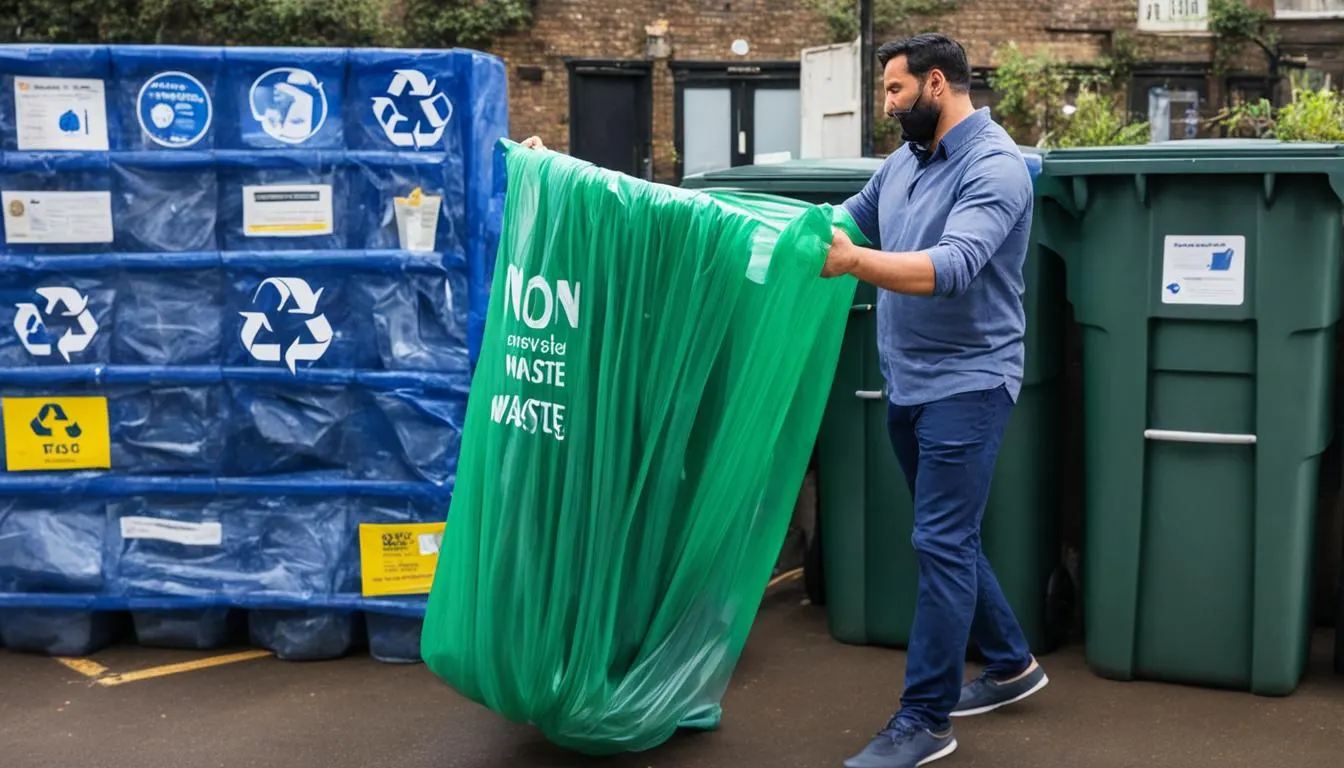
Contact Local Recycling Facilities
Not all recycling centers accept shower curtains due to the variety of curtain materials. Thus, contact your local facilities to ask if they take the material your curtain is composed of. Provide them with the recycling code you located to ensure accuracy.
Clean the Curtain for Recycling
Before recycling, it’s essential to clean your shower curtain. Wash it in your washing machine with mild detergent to remove any soap scum, mildew, or bacteria. A washable shower curtain should be laundered to prevent contamination of other recyclables.
Remove Non-Plastic Parts
Most curtains have metal grommets or rings. You need to remove them before recycling. Any non-plastic item left on the curtain can interfere with the recycling process. So, be thorough in your deconstruction.
Drop-off (If Accepted)
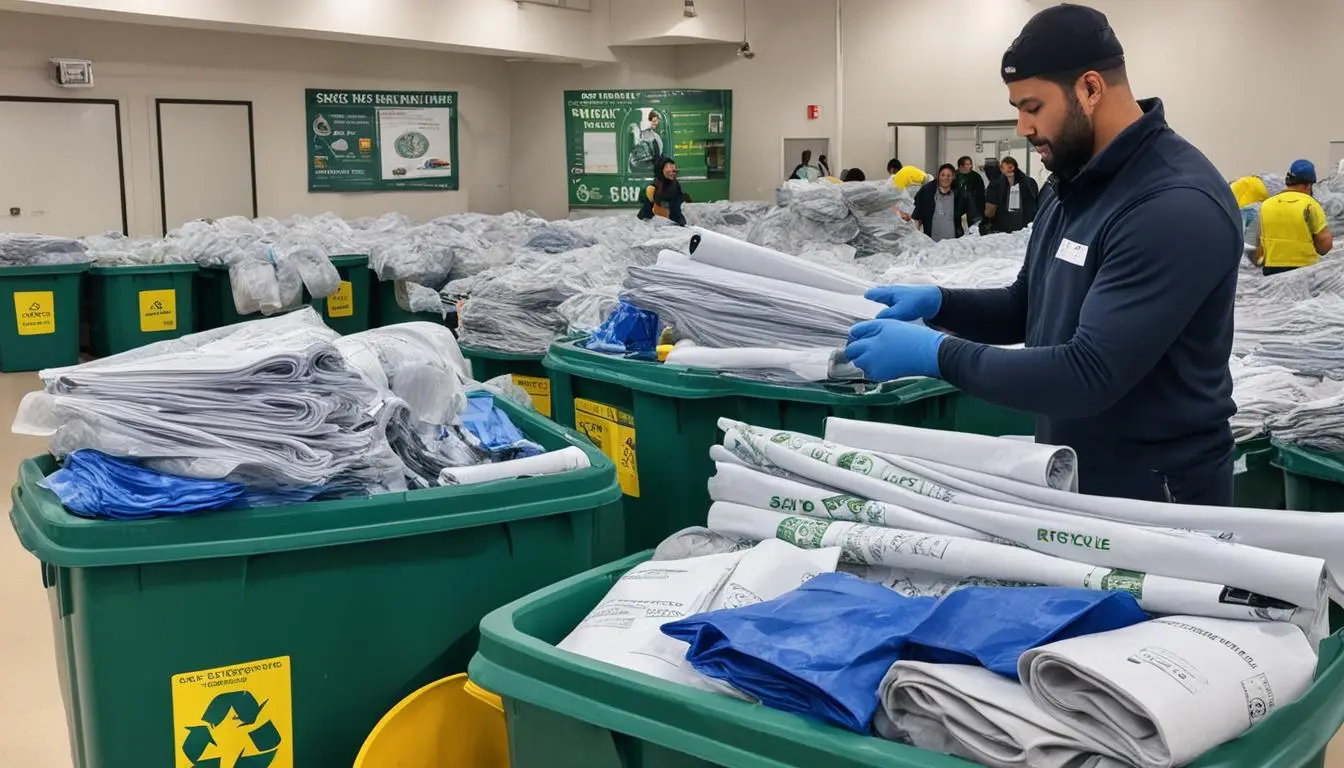
If your local facility accepts shower curtains, you should follow their guidelines for drop-off. This might include bringing the curtain to a specific location or preparing it in a certain way, such as folding or cutting it down to size.
Upcycle (If Not Accepted)
When recycling isn’t an option, consider upcycling your curtain. The following are some best practices to give it a new life and keep the environment in mind.
- Use your old curtain as a drop cloth during painting projects or in other messy activities to protect your floors and furniture.
- Convert your old curtain into a large, durable bag. It can transport items to the beach and picnics or even be a makeshift laundry sack.
- Cut it up to create custom-sized protective sheets for lining shelves, drawers, or under pet food dishes.
Eco-Friendly Alternatives to Traditional Plastic Shower Curtains

For a more sustainable lifestyle, alternatives to traditional plastic shower curtains are becoming more important. Let’s explore some of these alternatives and understand why they are a superior choice for your bathroom and the planet.
Hemp Shower Curtain
Hemp is well-regarded for its durability and mildew resistance. These make hemp shower curtains an excellent option for bathrooms. These curtains are made from one of nature’s strongest fibers and are entirely biodegradable. As a fast-growing crop, hemp also benefits the soil and requires less water. It’s a powerhouse of sustainability.
Organic Cotton Shower Curtain
Organic cotton brings softness and chemical-free purity to the bathroom. Unlike conventional cotton, organic cotton has no toxic pesticides or synthetic fertilizers. They are kinder to the environment. They are also very versatile, coming in various styles to complement any decor.
Linen Shower Curtain
Linen, made from the flax plant, is famous for its eco-friendly nature and inherent elegance. A linen shower curtain adds a touch of organic texture to a bathroom while being environmentally responsible. This material is not only lightweight and quick-drying but also becomes softer with each wash.
Recycled Polyester Shower Curtain
In a beautiful twist of innovation, recycled polyester shower curtains give new life to plastic bottles. These curtains maintain the functional benefits of traditional polyester. They also reduce the ecological footprint by repurposing existing materials.
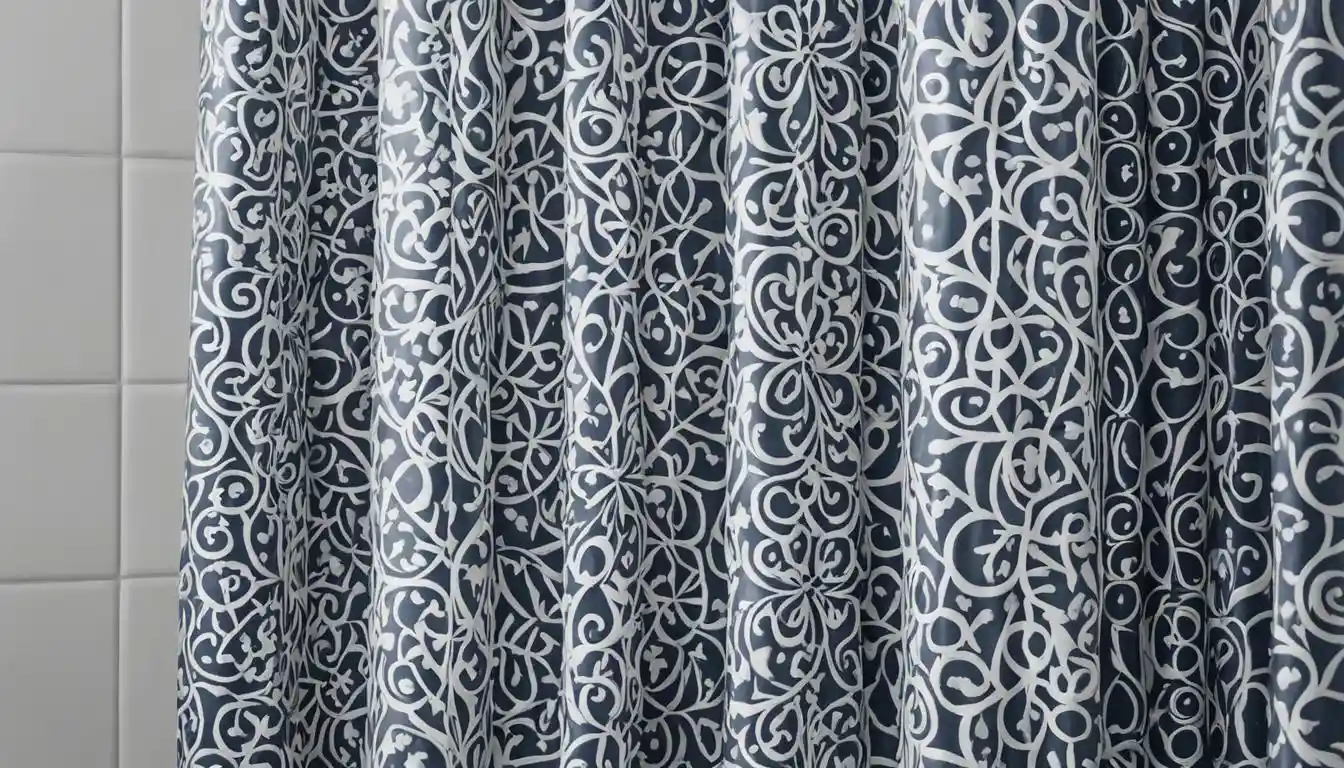
Bamboo Fabric Shower Curtain
Bamboo fabric is another sustainable hero, renowned for its antibacterial properties and softness. Bamboo shower curtains are not only stylish but also eco-friendly due to bamboo’s fast regrowth rate and minimal water usage. They act as a natural barrier against water splashes.
Tencel Shower Curtain
Tencel is a breakthrough in the fabric industry. It is from sustainably sourced wood pulp and closed-loop production processes. Tencel shower curtains are eco-friendly. They stand out for their smooth texture and moisture-wicking abilities. They provide an upmarket and conscientious bathroom accessory.
Our Top Recommendation: Polyester Shower Curtains

When it comes to selecting a shower curtain, polyester is at the top of our recommendation list. It is a popular choice due to its durability and mildew-resistant properties.
One of the critical benefits of polyester shower curtains lies in their endurance. These curtains can withstand the humid and wet conditions of bathrooms. They can maintain their structure and appearance over time. This durability translates to fewer frequent replacements and, as a result, less waste generated.
Moreover, mildew resistance is a significant concern in the warm, moist climate of a shower area. Polyester shower curtains are often treated to repel water and mildew. They help maintain a cleaner and more hygienic bathroom environment.
Although polyester is not biodegradable, there is a growing market for recycled polyester. This means that instead of ending up in a landfill, the material can be reprocessed and turned into new products. This gives it a new lease of life beyond its use as a shower curtain.
In general, choosing a recycled polyester shower curtain from Cottoncat is a smart decision. This choice fulfills your immediate requirements and also reflects your broader commitment to environmental responsibility. It’s a responsible choice for those who want to keep their bathroom both functional and trendy while minimizing environmental impact. Visit us at Cottoncat.com to explore our range of stylish and sustainable shower curtains, perfect for any eco-conscious home.
Conclusion
In general, plastic shower curtains are not recyclable due to the type of plastic they are made from and the difficulty of separating them from other materials. However, there are alternative options that are more environmentally friendly. It’s important to consider these alternatives to reduce the environmental impact of disposable plastic shower curtains.
FAQs
How should you recycle a plastic shower curtain?
First, identify the material it’s made of and look for any recycling symbols. Clean it thoroughly to remove mold and mildew. Remove any non-plastic components, such as metal rings or hooks. Contact local recycling facilities to see if they accept the material. If so, drop off the curtain at the designated location. If not, consider upcycling the curtain into another useful item.
How do you responsibly dispose of a non-recyclable shower curtain?
If you cannot recycle your curtain, reuse it as a drop cloth for painting or a protective sheet for storage. Or you can even reuse it as a heavy-duty bag for transporting items. If you must dispose of it, ensure you throw it away responsibly. This will minimize its environmental impact as much as possible.
What are some eco-friendly materials for shower curtains?
Alternatives include those made from eco-friendly materials such as hemp, organic cotton, linen, recycled polyester, bamboo fabric, and Tencel. These materials are often biodegradable and recyclable.
Why are polyester shower curtains recommended?
Because they strike a balance between functionality and environmental consideration. They are mildew-resistant, durable, and can be made from recycled materials. When choosing a polyester curtain, look for options made from recycled content to further enhance sustainability.

